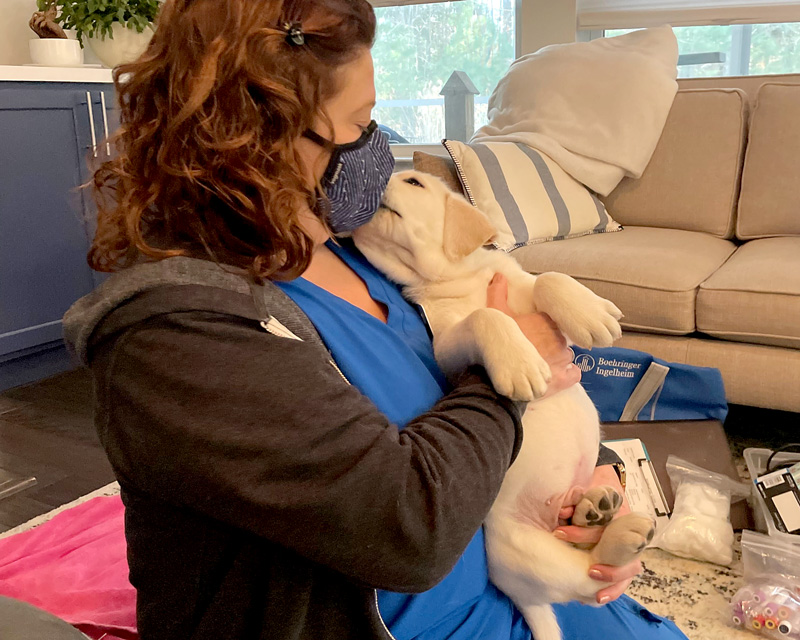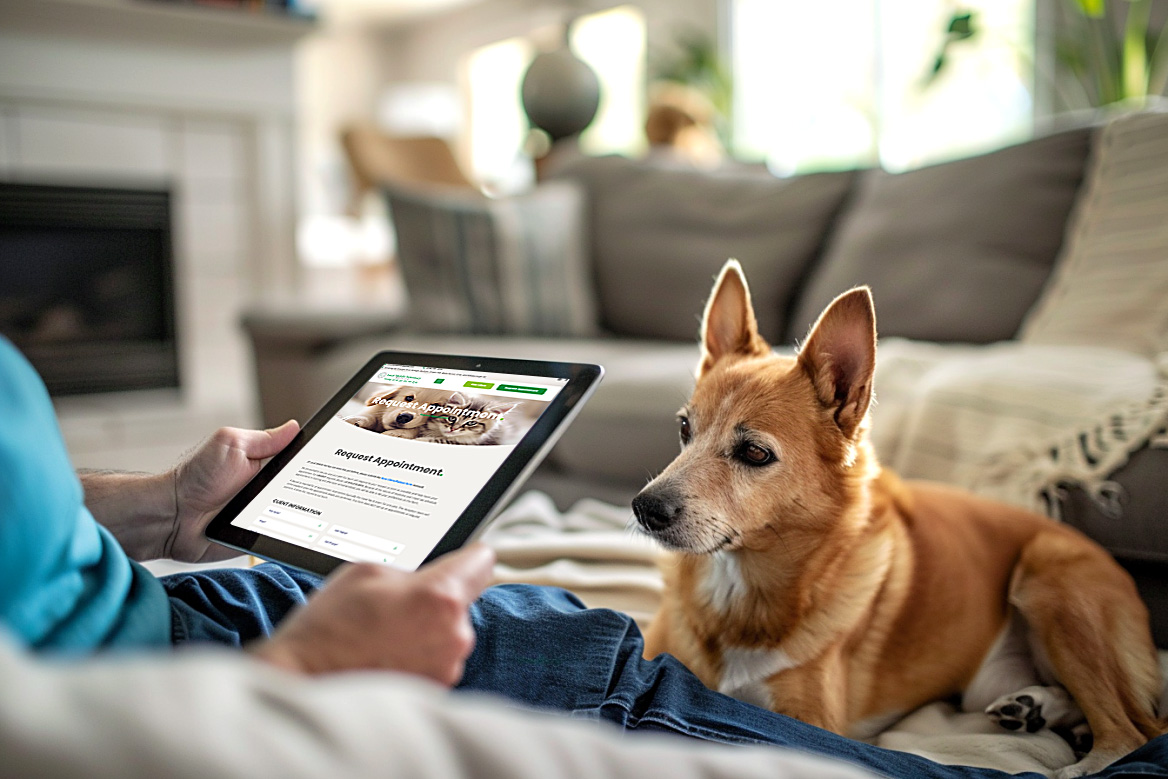- Servicing the Triangle Area: Raleigh, Durham, Chapel Hill, Wake Forest, Cary, and Hillsborough NC
Puppy Care

Congratulations on your new furry friend! It is very important that your puppy is seen by a veterinarian for regular examinations for the first few months of his/her life to make sure he/she is growing normally and to ensure vaccines are given on time. Below is some basic medical information that may be helpful getting your new little one settled at home.
Vaccines
To ensure adequate protection from deadly, but preventable, diseases, vaccines must be given according to each vaccine's label. Some vaccines only require a single administration to achieve protection while others require boosters. Vaccines that require boosters must be given within three to four weeks, or the series of vaccines may have to be restarted. It is very important that you not miss your pet’s booster appointments. It is important to note that after a vaccine is administered it is not effective immediately. Vaccines can take up to two weeks in the body to generate a protective immune response.
Below are the diseases/vaccines that we recommend in dogs. Vaccines marked with a * are those that we consider "core" vaccines, meaning that we recommend these vaccines for every dog. After discussing your puppy's lifestyle and risk the veterinarian will determine the best vaccine protocol for him/her.
Rabies*: This is a deadly virus that affects the nervous system. This disease is transmissible to humans and almost 100% fatal to dogs, cats, humans, and many other species. By law all dogs, cats, and ferrets in North Carolina must be vaccinated for Rabies by 4 months of age. Puppies must be at least 12 weeks old to receive this vaccine. A single dose of this vaccine achieves a year license for protection.
Distemper/Parvo/Adenovirus/Parainfluenza*: (aka "Distemper/Parvo" or "DHPP" or "combo" vaccine) - These are all very serious diseases that affect many body systems and can be deadly. Most notably, parvo virus is particularly concerning in puppies. This vaccine requires at least three boosters to be given to achieve protection for one year. This vaccine series is usually started at 6-8 weeks of age and repeats every 3-4 weeks until your puppy is over 16 weeks of age.
Leptospirosis*: (aka "lepto") - This is a bacteria that can be transmitted across multiple species, including humans. This bacteria causes kidney and/or liver failure among other things. This vaccine requires two boosters to achieve one year of protection. This vaccine is usually started at the second or third puppy visit.
Bordetella: This is a bacteria that can cause upper respiratory infection and can lead to more serious infections like pneumonia. This was previously called the "kennel cough" vaccine, but now we know that the symptoms of kennel cough can be caused by several different viruses/bacteria. A single dose of this vaccine gives one year of protection. We recommend this vaccine to any dogs that socialize with others (go to dog parks, doggy day care, play with other dogs on walks), that board at kennels, travel, or go to the groomers.
Influenza: (dog flu) - This is a virus that causes upper respiratory infections, but can lead to more serious infections like pneumonia. This vaccine requires two boosters to achieve one year of protection. Like the bordetella vaccine, we recommend the flu vaccine to at risk dogs.
Lyme: This is a bacteria spread via ticks. Most commonly this disease causes lethargy and stiff joints, but can sometimes cause kidney disease and neurologic conditions. Using regular tick prevention also helps decrease the risk of this disease. This vaccine requires two boosters to achieve one year of protection. We recommend the lyme vaccine to dogs who will do lots of hiking or outdoor activities.
Vaccine Reactions
A normal vaccine response causes inflammation within the body as the body's immune system recognizes and responds appropriately to the vaccine. It is very common for dogs to be quiet the day of the vaccine, but they should be normal by the next morning. It is also common for some soreness at the injection site. Please let your vet know if your puppy is displaying any abnormal signs after a vaccine. Most likely it is nothing to be concerned about, but the veterinarian may recommend changing the vaccine protocol for your puppy depending on what is going on.
A true vaccine reaction is extremely rare, but a serious life-threatening event. Should you see any signs of facial swelling/squinting/drooling or hives you should seek veterinary treatment for your puppy immediately. A vaccine reaction usually occurs very shortly after administering the vaccine, usually within minutes, but may occur up to a couple of hours after.
Intestinal Parasites / Deworming
It is very common for puppies to have intestinal parasites. There are many different types of intestinal parasites and several different deworming medications. A fecal test can identify if your puppy has any intestinal parasites and what type so that we can choose the best treatment. We may recommend a recheck fecal test in 3-4 weeks if your puppy is positive for any parasites.
Spay / Neuter
Spaying or neutering is a surgical procedure under general anesthesia that results in the inability to reproduce. Please discuss this procedure and its benefits with your veterinarian. Spaying and neutering helps prevent multiple diseases (ie breast cancer, pyometra, prostatitis, testicular cancer) and can help prevent unwanted behavior problems, like marking, aggression, and roaming. Over one million dogs and cats are euthanized in shelters annually. Spaying and neutering also helps address this overpopulation crisis. The timing as to when this procedure should be performed should be discussed so that you can make an informed decision about what is right for you and your puppy.
Obedience / Training / Socialization
The most critical period for your dog's social development is when she is less than 16 weeks old. During this crucial time in development it is important that your puppy be socialized with other puppies (aside from housemates), that she is exposed to as many new environments/experiences as possible, and that basic obedience training is started. Since your puppy's vaccines are not completed yet it is important any socialization with other dogs be done in a controlled environment (i.e. with other puppies that are vaccinated). A puppy class where they require proof of vaccination is a great place to start this process because you can be sure that the other puppies in the class have some protection against contagious diseases. We would NOT recommend dog parks until after some basic socialization/obedience training and the full vaccine series is completed. Dog parks can be very dangerous for puppies that aren't sure of how to play with other dogs yet and because other adult dogs may be carrying diseases without showing any signs of sickness.
We strongly recommend that you start practicing toe-touching, basic restraint, grooming, bathing, etc with your puppy immediately and devote a few minutes to it each day. These experiences should be positive and rewarded, and will help make medical and grooming visits less stressful for your dog as they get older. Check out Vetiquette.pet for more information on getting your pet more comfortable with being handled.
For more information on puppy training go to Dunbaracademy.com to download these great, FREE books to help you and your new pup learn what else to do.
Preventative Medications
Heartworm disease: Heartworm disease is spread by mosquitoes so all dogs are at risk. This disease causes progressive heart failure and death if left untreated, and treatment can be very expensive and dangerous. It is far better to prevent this disease, as even if it is caught early, there will already be considerable damage to the heart. Your puppy should start taking a monthly heartworm preventative once monthly and will remain on this preventative for the rest of his/her life. North Carolina is a particularly at-risk area of the country and pets should remain on preventative year round.
Flea/Tick: All dogs should be on flea preventative as flea bites are the most common cause of skin disease in dogs and cats and once you have fleas in your home it takes a minimum of 3 months to eradicate the infestation completely. All dogs who frequent the woods or grassy areas should also be on tick prevention.
 How do I get my pet scheduled?
How do I get my pet scheduled?
If your pet is an existing patient of Local Mobile Vet, simply fill out the appointment request form, and we will reach out to get an appointment scheduled.
If we have never seen your pet before, fill out the New Client Form and we will reach out to help you determine if we are the right fit for you and your pet.
